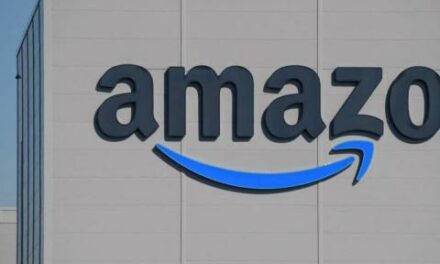We support our Publishers and Content Creators. You can view this story on their website by CLICKING HERE.

According to a congressional report made public on Friday, President Joe Biden’s administration has gotten banks to surveil the economic habits of of their customers, especially the ones suspected of supporting President-elect Donald Trump.
Under the guise of identifying potential terrorists and money launderers, the FBI and Treasury Department sought help from 16,000 financial institutions without subpoenas looking for tickets purchased to conservative gatherings, the purchase of Bibles or anything with keywords like “Trump” or “MAGA.”
The official X account for the Select Subcommittee on the Weaponization of the Federal Government released its report on X along with the text: “Think your finances are private? Think again.”
In another post on X Friday, the panel wrote: “Without safeguards, this could lead to widespread abuse of power and debanking.”
“Debanking” is the phenomenon of a bank closing an account of a customer due to their political activity. Conservative filmmaker-podcaster-author Dinesh D’Souza told Just the News that JPMorgan Chase Bank debanked him two years ago. JPMorgan Chase didn’t respond to a request for comment.
With all of this going on, Christian Briggs, a long-time professional in precious metals is opening a first-of-its kind modern bank that will be based on the gold standard – and spying and debanking will not be part of the equation.
In an interview with Just the News, Briggs described his new venture, appropriately called the Gold Standard International Bank, and he made some sobering predictions about the economy.
Although Trump ran for president promising to reverse inflation, Briggs doubts it will happen any time soon.
“Trump will create inflation, and that’s economic growth,” said Briggs, who founded BMC Capital four decades ago and followed that up by creating Hard Asset Management.
The key is lowering energy costs, which could lead to less than 3 percent inflation, though maybe not until 2026, said Briggs,
“Long term, some banks will go under because nine of 10 dollars in deposits are in long-term treasuries over 10 years and they’re getting annihilated, so the Fed will have to bail them out, and that’s inflationary,” Briggs continued.
In October, for example, the Treasury Department bought back $7 billion of its securities at below par value. The Treasury purchases long-term debt from select banks to keep them liquid.
“If the 10-year goes past 5 percent, you’ll have 8 percent mortgages, then the economy is done, and you’ll have to pump cash into it. That cycles into inflation,” he said.
On the other hand, he’s very bullish about Trump’s creation of the Department of Government Efficiency, to be run by entrepreneurs Elon Musk and Vivek Ramaswamy. If they succeed in surgically cutting government waste, it could likley lead to Federal Reserve rate cuts – or minimal rate increases – and tamer inflation.
“The difference is [2024 Democratic presidential nominee] Kamala Harris would have destroyed the economy for four years,” Briggs said. “Her policies follow closer to a Marxist-style society whereby it’s increasingly challenging for business to grow and build wealth.”
While supportive of Trump, his prediction of inflation coincides in some respects with economists who are anti-Trump.
Many of them criticize the president-elect for his plan to slap tariffs on goods coming from other countries – up to 60% on imports from China, for example, or 25% for Canada and Mexico unless they improve on preventing illegal immigration and drug trafficking across the U.S. border.
The left is also attempting to make the case that Trump’s plan to deport millions of illegal migrants will lead to labor shortages and higher wages, which is also inflationary. Ditto for tax cuts, which would lead to more borrowing and higher deficits, they argue.
The national debt was about $10.6 trillion when President Barack Obama took office in 2009, and sits at about $36 trillion today. Next year, interest on the debt will hit $1.4 trillion, 25% of all federal revenue.
In that same timeframe, gold has risen in value nearly 200%, and Briggs is predicting it will continue to rise during Trump’s second term.
That last part is critical to Briggs as he prepares to break new ground with his Gold Standard International Bank.
“Rare coins and rare cars do incredibly well under Republican presidents,” he said.
Briggs’ interest in precious metals began as a teenager when he turned his passion for collecting rare coins into a business, launching Briggs Numismatic, sometimes selling on consignment, sometimes taking ownership and selling at a profit. Late 18th century “Flowing Hair” silver dollars were a particular favorite.
When he got tired of customers misspelling “numismatics” on the checks they wrote him, he changed his firm’s name to BMC Capital – BMC being a stand-in for “Bring Me Cash.” Then he founded as a sister company to BMC, Hard Asset Management.
And early next year, the 57-year-old expert in all things rare and precious will launch his gold-standard bank chartered in Barbados, where gold is considered cash and its central bank deals with 42 currencies daily. And where he and his customers would conceivably be immune to government agencies hoping to spy on their financial habits.
His new bank works like this: someone with large amounts of gold, silver, platinum or even valuable art will store it in a mutually agreed place where the bank has access in case of a margin call. The rarities are insured by Lloyds of London.
Storage fees run from 38-45 basis points annually – $1 million in gold, for example, would cost $3,800 a year to store – and the bank would offer clients loans of up to 70 percent of the value of their stored assets at interest rates from 5.5 – 6.5 percent.
“That’s cash-on-cash lending and we will make a 200 to 300 point basis spread, and that’s the lowest-risk form of banking,” Briggs told Just the News.
One goal is to launch branch-banking and family offices stateside, and he’s also targeting mining operations with above-ground assets and other banks as future clients.
“We’re not going after a niche market, we’re going after an underserved market,” Briggs said.
Minimum deposits will run around $500,000 and Briggs also sees governments worldwide as potential clients, in particular those in Eastern Europe, Africa and the Middle East.
“They want to create liquidity on their gold holdings, but they don’t want to print more money or issue bonds,” he said. “II gold continues to rise, countries could increase their lines of credit with us.”
Briggs estimates there is $22 trillion in gold in the world with about 20 percent owned by governments, though exact numbers are unreliable given speculation that some countries are less than forthcoming about their holdings.
Whatever the actual number is, there is little liquidity against gold, and Briggs aims to change that.
“If we pay them 2.5% to 3% interest, they’re happy, because they’re looking for a place to preserve their wealth without the risk of losing principle,” he said.
He said his new bank is looking to buy brick-and-mortar storage facilities that are already in place, and identifying real estate for building additional ones. They already have facilities in Tennessee and Texas.
“Most people love gold but don’t know how to buy it, and they don’t want to tie up cash in something that doesn’t pay a dividend,” he said. “With us, you can buy the gold, we can bring liquidity to you at a low rate, and you’ll have a growth asset with a marginal amount of interest. You buy $1 million in gold, we’ll give you a $700,000 line of credit.”

 Conservative
Conservative  Search
Search Trending
Trending Current News
Current News 




